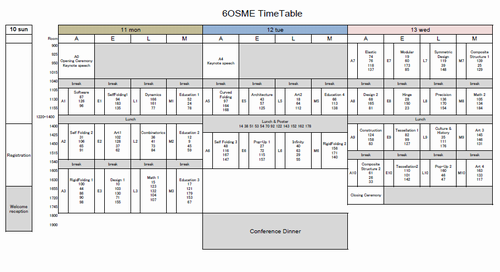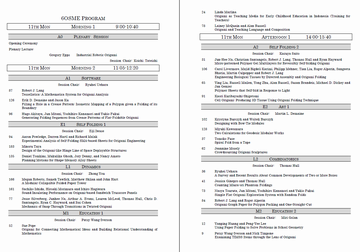Program
Program Outline
Sunday August 10
- Registration(*)
- Welcome reception (evening)
Monday August 11
- Opening ceremony
- Keynote speach 1
- Paper Sessions
Tuesday August 12
- Keynote speach 2
- Paper Sessions
- Conference Dinner (optional)
Wednesday August 13
- Paper Sessions
- Closing
Thursday August 14
Friday August 15 - Sunday August 17
- Excursion: The 20th Origami Tanteidan Convention (optional)
(*) The registration desk will be open during 6OSME proceedings.
Time Table
6OSME-Timetable-0805.pdf
Detailed Program
6OSME-Program-0806.pdf
Optional Events
Thu. Aug. 14 (9pm-12pm), Public lesson
Grade level: Grade 9
Time: 9am - 12pm
Lesson Title: Origamics: Pursuit of the mathematical principle that lurks in origami
Location: To be announced
Fee: Free
The lesson will be in Japanese with simultaneous translation by Dr. Masami Isoda.
Registration is limited to 40 people. To register, please send an email to: 6osme.publiclesson@gmail.com
A number of half-day tours will be available on 14 August, some of which will start in the afternoon. So, it is possible to attend the public lesson and participate in an afternoon tour.
Thu. Aug. 14, Excursion : A bus tour in or around Tokyo
Some half-day tours which capture the essence of Tokyo through visits to traditional tourist spots. We will inform the contents to the parsons who checked on the registration form the option of a bus tour on 14th.
Fri. Aug. 15 - Sun. Aug. 17, The 20th Origami Tanteidan Convention
See details here.
Exhibition
The exhibition of origami, which includes artworks, engineering applications, and sponsoring companies' products, is held at Yayoi Auditorium Annex during 6OSME.
This exhibition is opening to the public.
Hours
Sun. 10, 14:00 - 16:00
Mon. 11, 9:30 - 17:00
Tue. 12, 9:30 - 16:00
Wed. 13, 9:30 - 13:30
Invited Speakers
Gregory Epps
Industrial Robotic Origami
Aug. 11th
 Gregory Epps is the founder of RoboFold and one of the first people to appropriate robotics
for applications in design and architecture. He graduated from the Innovation Design
Engineering joint masters at the Royal College of Art and Imperial College London.
Gregory is involved in both industry and academia. His clients vary from Zaha Hadid Architects,
Foster and Partners, to Joris Laarman and BMW and he has taught at over 100 workshops
globally and lectures internationally, including Smart Geometry, the Architectural Association DRL,
Rensselaer Polytechnic Institute, IaaC, Bartlett, ETH Zurich and many more.
Gregory Epps is the founder of RoboFold and one of the first people to appropriate robotics
for applications in design and architecture. He graduated from the Innovation Design
Engineering joint masters at the Royal College of Art and Imperial College London.
Gregory is involved in both industry and academia. His clients vary from Zaha Hadid Architects,
Foster and Partners, to Joris Laarman and BMW and he has taught at over 100 workshops
globally and lectures internationally, including Smart Geometry, the Architectural Association DRL,
Rensselaer Polytechnic Institute, IaaC, Bartlett, ETH Zurich and many more.
Masao Okamura
Origami works that Kuzuhara Koto brought down to us
Aug. 12th
 Masao Okamura was born in Tokyo in 1934. He is an advisor at Japan Origami Academic society and a researcher of the history of origami. He delivered a speech "Another View of the Word 'ORIGAMI'" in 2nd OSME at Otsu.
Masao Okamura was born in Tokyo in 1934. He is an advisor at Japan Origami Academic society and a researcher of the history of origami. He delivered a speech "Another View of the Word 'ORIGAMI'" in 2nd OSME at Otsu.
List of Presentations
List of Accepted Presentations (Oral / Poster) for August 11th-13th
(the list is ordered according to the submission date)
| Patsy Wang-Iverson and Nick Timpone | Examining TIMSS Items through the Lens of Origami |
| Ilan Garibi | Design Art - Taking the Kami out of Origami |
| Peng Yee Lee and Huang Yanping | Using paper folding to solve problems in school geometry |
| Jorge Pardo | Origami Museum |
| Roger Alperin | Axioms for Origami and Compass Constructions |
| Arnold Tubis | Origami-Inspired Deductive Threads in Pre-Geometry |
| Cheng Chit Leong | Design of Origami Polyhedral Surface by Straight-crease Couplets |
| Andrea Hawksley | Topological Origami Models of Non-Convex Polyhedra |
| Naohiko Watanabe | Application of rigid-foldability condition to yield line analysis |
| Linda Marlina | Origami as Teaching Media for Early Childhood Education in Indonesia (Training for Teachers) |
| Joseph Gattas and Zhong You | Improvement and optimisation of non-Miura foldcores under impact loading |
| Joseph Gattas and Zhong You | Design and analysis of morphing folded shell structures |
| Jun Mitani | Self-Intersecting Origami with Cuts |
| Jianguo Cai and Jian Feng | Foldable Plate Structures with Rolling Joints |
| Leon Poladian | Using the Fujimoto Approximation Technique to teach Chaos Theory |
| Jun-Hee Na, Christian Santangelo, Robert Lang, Thomas Hull and Ryan Hayward | Micro-patterned polymer gel multilayers for reversibly self-folding origami |
| Jonathan Ho and Zhong You | Thin-Walled Deployable Grid Structures |
| Jun Maekawa | Computational Problems Related to Paper Crane in the Edo Period |
| Ryuhei Uehara | A survey and recent results about common developments of two or more boxes |
| Tomoko Fuse | Spiral fold from a tape |
| Xiang Zhou, Hai Wang and Zhong You | Design of Double-Walled Origami-Core Aircraft Fuselage Shell |
| Herng Yi Cheng | Composing Right Frusta to fold Axially Symmetric Origami |
| Ali Bahmani, Kiumars Sharif and Andrew Hudson | Using Origami to Solidify Mathematical Understanding of Fractals |
| Jessica Ginepro and Thomas Hull | Counting Miura-ori Phantom Folds |
| Pierluigi D'Acunto and Juan José Castellon Gonzalez | FOLDING AUGMENTED: A conceptual design method to integrate structural folding in architecture |
| Zachary Abel, Robert Connelly, Erik D. Demaine, Martin Demaine, Thomas Hull, Anna Lubiw and Tomohiro Tachi | Rigid Flattening of Polyhedra with Slits |
| Emma Frigerio | The Mathematical Legacy of Humiaki Huzita |
| Thais Regina Ueno Yamada | Origamic Architecture and Van Hiele Model in the Graduate Classroom of Descriptive Geometry |
| Thais Regina Ueno Yamada, Roberto Alcarria Do Nascimento and Marco Antonio Pereira | Geometric Strategies to Create Origamic Architecture Models |
| Edwin Peraza Hernandez, Darren Hartl, Richard Malak, Ozgur Gonen and Ergun Akleman | Self-Folding of Reconfigurable Complex Structures using Programmable Active Laminates |
| Bernat Espigule Pons | Folding Self-similar Tilings Based on Prototiles Constructed from Segments of Regular Polygons |
| Sue Pope | Origami for connecting mathematical ideas and building relational understanding of mathematics |
| Katrin Shumakov and Yuri Shumakov | ACTIVATING LEFT AND RIGHT BRAIN FUNCTIONS WITH ORIGAMI |
| Ketao Zhang, Chen Qiu and Jian S. Dai | Screw Algebra Based Kinematic and Static Modeling Approach for Origami Enabled Structures |
| Ushio Ikegami | Base Design of Snowflake Curve Model and its Difficulties |
| Caterina Cumino, Emma Frigerio, Simona Gallina, Maria Luisa Spreafico and Ursula Zich | Modeling Vaults in Origami: a Bridge between Mathematics and Architecture |
| Sicong Liu, Guoxing Lu, Yan Chen and Yew Wei Leong | Experiments and Analysis of the Miura-ori Fold Core |
| Emma Frigerio and Maria Luisa Spreafico | Area and Paper Optimization |
| Sarah-Marie Belcastro and Thomas Hull | Symmetric Colorings of Polypolyhedra |
| Rui Peng and Yan Chen | The Metamaterial generated from Rigid-origami Pattern |
| Jeannine Mosely | Crowdsourcing Origami Sculptures |
| Takamichi Sushida, Akio Hizume and Yoshikazu Yamagishi | Origami for triangular spiral tilings |
| Shi-Pui Kwan | Mathematics and Art through the Origami of Cuboctahedron |
| Michael Dickey, Ying Liu, Susan Brandeis, Russell Mailen, Yong Zhu, Alan Russell, Kelly Kye and Jan Genzer | Polymer Sheets that Self-fold in Response to Light |
| Miri Golan, Anat Klemer and John Oberman | Origametria: Research into its Effectiveness as a Tool for Developing Flexibility in Geometric Thinking |
| Miri Golan | Origami Teaching Re-imagined: The Kindergarten Origametria Programme |
| Paul Jackson | Paper Folding as a Topic of Design Education |
| Shozo Ishihara | Deformed Polyhedral Skeletons |
| Fukami Yuji | General Folding Pattern Solution for Solids based on Polygonal Sections |
| Yuto Kase, Jun Mitani, Yukio Fukui and Yoshihiro Kanamori | Flat-Foldable Axisymmetric Structures with Open Edges |
| Naoya Tsuruta, Jun Mitani, Yoshihiro Kanamori and Yukio Fukui | Simple Flat Origami Exploration System with Random Folds |
| Kazuko Fuchi, Philip Buskohl, James Joo, Gregory Reich and Richard Vaia | Physics-based Optimization of Origami Structures through FEM |
| Jesse Silverberg, Lauren McLeod, Arthur Evans, Jesica Ginepro, Chris Santangelo, Thomas Hull and Itai Cohen | Mechanics of Miura-ori Lattice Defects |
| Jesse Silverberg, Lauren McLeod, Arthur Evans, Jessica Ginepro, Chris Santangelo, Thomas Hull and Itai Cohen | Mechanics of Snap-Through Transitions in Twisted Origami |
| Lainey Mcquain and Alan Russell | Origami and Teaching Language and Composition |
| Matthew Gardiner | ORI* On the Aesthetics and Language of Folding and Technology: Scale, Dimensionality, and Material |
| Robert Lang | Spiderwebs, Tilings, and Flagstone Tessellations |
| Kevin Box and Robert Lang | Master Peace: An Evolution of Monumental Origami |
| Robert Lang and Roger Alperin | Origami Graph Paper for Polygon Packing and One-Straight-Cut |
| Robert Lang and Barry Hayes | Pentasia: an Aperiodic Origami Surface |
| Robert Lang, Thomas Evans, Larry L. Howell and Spencer P. Magleby | A Graphical Technique for Designing Rigidly Foldable Origami Mechanisms |
| Robert Lang | Tessellatica: A Mathematica System for Origami Analysis |
| Zachary Abel, Thomas Hull and Tomohiro Tachi | Locked Rigid Origami with Multiple Degrees of Freedom |
| Kaori Kuribayashi-Shigetomi | Cell Origami : Producing 3D tissue using origami folding technique |
| Takashi Enomoto, Hiroyuki Tanabe, Takeshi Kawakami and Mariko Sasakura | Origami on the iPad |
| Aaron Powledge, Darren Hartl and Richard Malak | Experimental Analysis of Self-Folding SMA-based Sheets for Origami Engineering |
| Hugo Akitaya, Jun Mitani, Yoshihiro Kanamori and Yukio Fukui | Generating Folding Sequences from Crease Patterns of Flat-Foldable Origami |
| Hugo Akitaya, Jun Mitani, Yoshihiro Kanamori and Yukio Fukui | Curved Origami for Developable Surface Coupling |
| Tomohiro Tachi | Rigid Folding of Periodic Triangulated Origami Tessellations |
| Thomas Crain | A New Scheme to Describe Twist-fold Tessellations |
| Chie Nara and Jin-Ichi Itoh | Flattening Plyhedra with Two Adjacent Rigid Faces |
| Tianyi Wang, Jun Mitani, Yoshihiro Kanamori and Yukio Fukui | A Study on Orthogonal Pleat Tessellation and Its Folding Sequence |
| Krystyna Burczyk and Wojtek Burczyk | Designing with Bow-Tie Modules |
| David Morgan and Brett Mellor | The Design and Production of a Folded Felt Stool |
| Masahiro Kushida and Toshikazu Kawasaki | On Quadratic Curves Generated from Quasi-Fish Bases |
| Fadoua Ghourabi, Tetsuo Ida and Kazuko Takahashi | Automated Construction and Proving of Knot Fold by Eos System |
| Carol Livermore, Majid Bigdeli Karimi, Philipp Mehner, Tian Liu, Roger Alperin, Sangeeta Bhatia, Martin Culpepper and Robert Lang | Engineering biological tissues by directed assembly and origami folding |
| Toahikazu Kawasaki | A way to fold generalized Bird bases |
| Valentina Beatini | A foldable rigid plate structure with tranformable curvature. |
| Eduard Taganap and Ma. Louise Antonette De Las Peñas | A Color Symmetry Approach to the Construction of Crystallographic Flat Origami |
| Koshiro Hatori | Saburo Murata and His Discovery of Maekawa's and Kawasaki's Theorems |
| Koshiro Hatori | Nishikawa's Mitate Theory and its Relevance |
| Akiko Yamanashi | The Report on an Origami Class at a Computer College |
| Yoshinobu Miyamoto | Rotational Erection System (RES): Origami Extended with Cuts |
| Katherine Frei, Edwin A. Peraza Hernandez, Richard Malak and Darren Hartl | Miura-Ori Rectilinear Locomotion Using SMA Actuators |
| Mark Neyrinck | Cosmological Origami: Folding up the Dark-Matter Sheet into the Cosmic Web |
| Arthur Evans, Nakul Bende, Sarah Innes-Gold, Nivedita Sharma, Jesse Silverberg, Itai Cohen, Ryan Hayward and Christian Santangelo | Geometrically controlled catastrophe and the link between snap buckling, origami, and material science |
| Shuang Tang, Jun Mitani, Yukio Fukui and Yoshihiro Kanamori | Designing Nth Order Rotational Symmetry Origami From 4th Order Symmetric Crease Patterns |
| Robert Orndorff | Hypothesis and Model for Evaluating an Elementary School Origami Program |
| Bo Yu, Maria Savchenko and Ichiro Hagiwara | Approach for unfolding 3D meshes for crafting paper models |
| Eulàlia Tramuns and Jordi Guàrdia | Geometric and arithmetic relations concerning origami |
| Rostislav Chudoba, Jan van der Woerd and Josef Hegger | Oricreate: modeling framework for design and manufacturing of folded plate structures |
| Martin Barej, Susanne Hoffmann, Martin Trautz and Burkhard Corves | A SYSTEMATICAL OVERVIEW OF ORIGAMI-BASED STRUCTURES IN TECHNICAL APPLICATIONS |
| Jason Ku and Erik Demaine | Filling a Hole in a Crease Pattern: Isometric Mapping of a Polygon given a Folding of its Boundary |
| Erik D. Demaine, Martin L. Demaine and Kayhan F. Qaiser | Scaling a Surface down to Any Fraction by Twist Folding |
| Miyuki Kawamura | Two Calculations for Geodesic Modular works. |
| Yves Klett, Marc Grzeschik and Peter Middendorf | Comparison of Mechanical Properties of Periodic Non-flat Tessellations |
| Tine De Ruysser | Wearable Metal Origami |
| Yves Klett | Point of View: Joys and Uses of 3D Anamorphic Origami |
| José Ignacio Royo Prieto and Eulàlia Tramuns | Abelian and non-Abelian numbers via 3D-origami |
| Annette Hatch | Using the Fibonacci Series to Fold a Golden Rectangle |
| Sy Chen | Equal Division of Any Polygon Side by Folding |
| Jory Denny, Mukulika Ghosh, Daniel Tomkins and Nancy Amato | Planning Folding Motions for Shape-Memory Alloy Sheets |
| Fumihito Imai and Shinsuke Hishitani | The effect of imagery controllability on Origami performance. |
| Evgueni T. Filipov, Tomohiro Tachi and Glaucio H. Paulino | Toward optimization of stiffness and flexibility of rigid, flat-foldable origami structures |
| Norma Boakes | Seven Year Study of Origami’s Impact on Spatial Skills of College-Age Students |
| Yang Yang, Xilu Zhao, Sunao Tokura and Ichiro Hagiwara | A study on crash energy absorption ability of lightweight structure by using truss core panel |
| Matthew Gong, Larry Howell and Spencer Magleby | Creating Novel Motions with N-Long Chains of Interconnected Spherical Mechanisms |
| Goran Konjevod | On pleat rearrangements in pureland tessellations |
| Koryo Miura and Naoko Tsuji | Three-point method of folding the rectangular paper into Miura-ori |
| Chris Palmer | Paper and Textile Folding A Synergistic Relationship |
| Christopher Itoh | The Elusive Technique of Folding Anatomical Subjects |
| Kazuya Saito, Akira Tsukahara and Yoji Okabe | Self-Deploying Origami Models Using Misaligned Crease Patterns |
| Ray Schamp and Goran Konjevod | Characterization of Origami Corrugation Crease Patterns |
| Bryce J. Edmondson, Robert J. Lang, Spencer P. Magleby and Larry L. Howell | An Orthogonal Construction Technique for Thick Rigidly Foldable Origami |
| Susanne Hoffmann, Benedikt Günther, Martin Barej, Martin Trautz, Jörg Feldhusen and Burkhard Corves | Comparison of Design Processes in Architecture and Mechanical Engineering |
| Susanne Hoffmann, Martin Barej, Benedikt Guenther, Martin Trautz, Burkhard Corves and Joerg Feldhusen | Demands on an Adapted Design Process for Foldable Structures |
| Goran Konjevod | Origami beyond geometry |
| Sachiko Ishida, Taketoshi Nojima and Ichiro Hagiwara | Origami-based Modeling Techniques for Deployable Meandering Tubes |
| Jian S. Dai | Mathematical Models and Configuration Transformation of Origami Cartons for Packaging Industry |
| Rupert Maleczek | Study on Deployable Linear Folded Stripe Structures |
| Georg Grasser, Rupert Maleczek and Günther H. Filz | Selforganised folding with gravity and friction as guiding concept |
| Guowu Wei and Jian S. Dai | Folding Polygons to Deployable Convex Polyhedrons |
| Sachiko Ishida, Hiroaki Morimura and Ichiro Hagiwara | Sound Insulating Performance on Origami-based Sandwich Trusscore Panels |
| Eiji Iwase and Isao Shimoyama | Magnetic Self-Assembly for Three-Dimensional Microstructures |
| Wensdy Whitehead | Shovel Folding: Algorithmic Origami Design of Words and Other Line Drawings |
| Suryansh Chandra, Shajay Bhooshan and Mustafa El Sayed | Curved-Folding Convex Polyhedra through Smoothing |
| Maori Kimura | [POP-UP PATTERN] Fabric of the ORIGAMI pattern to make with a puff print. |
| Megan Roberts, Sameh Tawfick, Matthew Shlian and John Hart | A modular collapsible folded paper tower |
| Abhinav Rao and John Hart | Millimeter scale self-folding of a laminated paper system |
| Erik D. Demaine, Martin L. Demaine, David A. Huffman, Duks Koschitz and Tomohiro Tachi | Designing Curved-Crease Tessellations of Lenses: Qualitative Properties of Rulings |
| Michael Winckler | ,,The next model is for Beginners“ First steps in Differential Origami |
| Zhonghua Xi and Jyh-Ming Lien | Determine Distinct Shapes of Rigid Origami |
| Eli Davis, Erik D. Demaine, Martin L. Demaine and Jennifer Ramseyer | Weaving a Uniformly Thick Sheet from Rectangles |
| Peter Engel | Origami and the Language of Design |
| Levi Dudte and L. Mahadevan | A Simple Mechanical Simulation of Curved and Tessellated Origami Structures |
| Rishika Daryanani, Celina Gonzalez, Paine Harris, Walshe Izumigawa, Bryce Lyon, Daniel Myers, Perla Myers, Tawni Paradise, Kerry Stanko, Veronica Verplancken, Anna Walsh and Elisabeth Yeruuldelger | Project Mathigami: Exploring Mathematics Through Origami |
| Minoru Taya | Origami-based actuator designs |
| Kazuo Haga | How to Fold an A4-paper Dividing into 101 Equal Length Parts without Any Mesuring Tools |